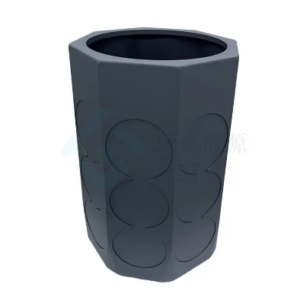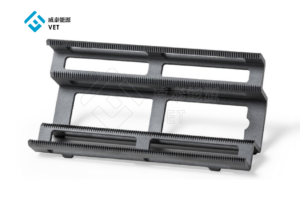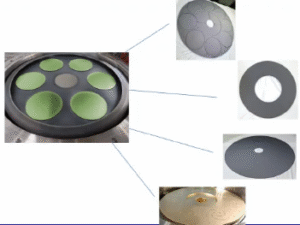Tantalum carbide (TaC) coating transforms the growth of SiC single crystals by providing exceptional thermal and chemical stability. With its low emissivity, it allows for precise temperature regulation, while its impurity suppression capabilities significantly improve crystal purity. These advantages facilitate faster and thicker crystal growth, establishing TaC coating as essential for manufacturing high-quality SiC single crystals in cutting-edge semiconductor technologies.

Thermal and Chemical Stability
High melting point and resistance to thermal degradation
Tantalum carbide exhibits one of the highest melting points among known materials, exceeding 3,800°C. This exceptional thermal property ensures that (TaC) coating remains stable even under the extreme temperatures required for SiC single crystal growth. Unlike other coatings that degrade or deform under prolonged heat exposure, TaC maintains its structural integrity. This stability prevents thermal fluctuations that could disrupt the crystal growth process. Manufacturers rely on this property to achieve consistent results in high-temperature environments.
Inertness to chemical reactions with SiC and other materials
The chemical inertness of tantalum carbide plays a critical role in its effectiveness. TaC does not react with silicon carbide or other materials commonly used in crystal growth systems. This inertness eliminates the risk of unwanted chemical interactions that could compromise the purity of the SiC single crystals. By acting as a chemically neutral barrier, TaC coating ensures that the growth environment remains uncontaminated. This property is particularly valuable in semiconductor applications, where even minor impurities can affect performance.
Prevention of contamination and edge defects during crystal growth
Contamination and edge defects pose significant challenges in SiC single crystal production. TaC coating addresses these issues by creating a protective layer that resists material deposition and particle adhesion. Its non-reactive surface minimizes the introduction of impurities into the growth chamber. Additionally, the coating reduces the likelihood of edge defects, which can occur when materials interact with uncoated surfaces. This results in higher-quality crystals with fewer structural imperfections, meeting the stringent demands of advanced semiconductor technologies.
Enhanced Crystal Growth Quality
Uniform temperature distribution with low emissivity
Tantalum carbide’s low emissivity ensures precise thermal management during SiC single crystal growth. By minimizing heat radiation, (TaC) coating promotes uniform temperature distribution across the growth chamber. This uniformity eliminates localized hot spots or cold zones, which often lead to uneven crystal structures. Consistent thermal conditions allow manufacturers to achieve superior crystal quality with fewer defects. The ability to maintain stable temperatures also enhances the reproducibility of the growth process, a critical factor in semiconductor production.
Reduction of impurities for higher-purity crystals
Impurity control remains a top priority in SiC single crystal manufacturing. The chemically inert nature of (TaC) coating prevents unwanted reactions that could introduce contaminants into the growth environment. Its non-reactive surface acts as a barrier, blocking external impurities from entering the system. This property ensures the production of high-purity crystals, which are essential for advanced electronic devices. By reducing contamination risks, TaC coating supports the creation of defect-free crystals with exceptional electrical properties.
Faster, thicker, and larger crystal growth for semiconductor applications
The thermal stability and chemical resistance of TaC coating enable faster and more efficient crystal growth. Its ability to maintain optimal conditions allows for the production of thicker and larger SiC single crystals. These larger crystals meet the growing demand for high-performance semiconductors in industries such as power electronics and telecommunications. The enhanced growth rate reduces production time, making large-scale manufacturing more cost-effective. TaC coating thus plays a pivotal role in advancing semiconductor technology.
Equipment Protection and Energy Efficiency
Prolonging the lifespan of graphite components
Graphite components in SiC single crystal growth systems often face degradation due to extreme temperatures and chemical exposure. Applying (TaC) coating significantly extends their lifespan. The coating acts as a protective barrier, shielding graphite from oxidation and thermal wear. Its high melting point and chemical inertness prevent damage caused by prolonged exposure to harsh conditions. This durability reduces the frequency of component replacements, minimizing downtime and maintenance costs. Manufacturers benefit from enhanced operational efficiency and reduced expenses over time.
Lower energy consumption due to optimized thermal properties
Energy efficiency plays a crucial role in large-scale crystal production. (TaC) coating optimizes thermal management by reducing heat loss through its low emissivity. This property ensures that more energy is retained within the growth chamber, maintaining consistent temperatures with less power input. The uniform heat distribution facilitated by the coating further enhances energy utilization. By lowering energy consumption, manufacturers achieve significant cost savings while reducing the environmental impact of their operations. This makes (TaC) coating an environmentally responsible choice for SiC single crystal growth.
Cost-effectiveness in large-scale crystal production
The combined benefits of equipment protection and energy efficiency translate into substantial cost savings for large-scale production. The extended lifespan of graphite components reduces replacement costs, while optimized thermal properties lower energy expenses. Additionally, the faster and higher-quality crystal growth enabled by (TaC) coating improves production throughput. These advantages make it a cost-effective solution for industries requiring high-performance SiC single crystals. By investing in this advanced coating technology, manufacturers can achieve superior results while maintaining economic viability.
Tantalum carbide (TaC) coating revolutionizes SiC single crystal growth with its unmatched properties:
- Thermal and chemical stability ensures consistent performance under extreme conditions.
- Enhanced crystal quality delivers defect-free, high-purity crystals.
- Equipment protection and energy efficiency reduce costs and extend component lifespan.
Industries prioritizing high-performance SiC crystals gain superior results by adopting TaC coating technology.







